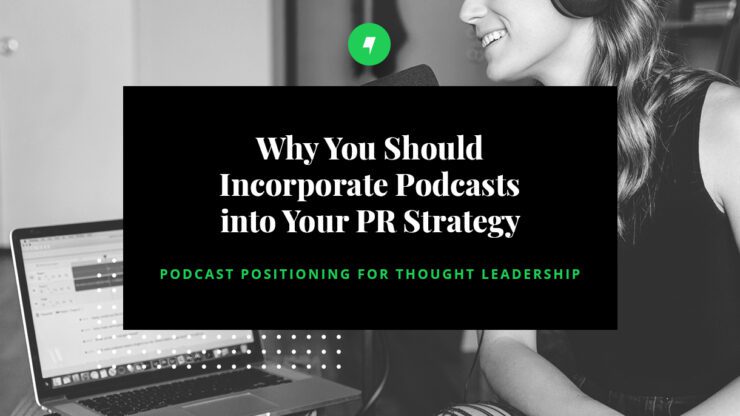Podcasts have increasingly become a popular content channel for brands, and an effective tool for PR professionals. According to data from Demand Sage, there are 5 million podcasts globally. So far in 2023, there are more than 464 million podcast listeners globally, with projections to reach 504.9 million by 2024.
Now more than ever, there are multiple reasons PR professionals should include podcasts as a tool in their communications strategy. Here are the top five reasons you should include podcasts in your next media pitch:
They don’t require visual attention.
Unlike watching a television broadcast or reading a written article, podcasts do not require active attention. Some may think that this is a negative, but the ability to be a secondary listening activity is one of podcasting’s greatest assets. Individuals can listen to podcasts during daily activities like their work commute, running errands, cooking, cleaning, or working, which maximizes audience reach. All you need to listen to a podcast is a smartphone, making them easily accessible and portable to listeners whenever and wherever they want.
They create brand authenticity.
Although it is important to come to any media interview prepared with the key messages you want to convey, podcasts are usually more informal in nature. This longer conversational form content is beneficial as it can allow the guest’s personality to really shine and allows for time to go more in depth about a brand story. This may allow the listener to have a more authentic perspective about a brand and the people behind it, which helps create a parasocial relationship between a brand and its audience.
They provide versatility to target both niche and broad audiences.
A common cited benefit of podcasts is the ability to target very niche audiences. While that is true, being a guest on a widely listened to podcast comes with its own set of advantages. Widely listened to podcasts like How I Built This, interviews entrepreneurs about their brand story. Others like Stuff You Should Know takes investigative deep dives on a wide variety of topics. Podcasts with this format give a platform to reach new audiences. However, if the goal is to target a specific audience, there is no shortage of niche podcasts. The Pen Addict Podcast, discusses all things stationary from paper, pens, pencils, to ink. The Shezam Podcast discusses topics of diversity and inclusion in the world of magic. Each format plays its own beneficial role in establishing brand awareness and stronger audience relationships.
They provide more time to connect with the audience.
Unlike condensed broadcast segments and articles, podcast episodes average an hour long. This platform gives a unique opportunity for guests to have longer and more engaging conversations than a normal interview. Podcasts allow guests to share more information about themselves, establish thoughts as an industry leader, and capture the audience’s attention.
They provide amplified SEO.
Podcasting is a great media positioning outlet as there are multiple hosting platforms that podcasts are posted to. For example, an episode can be posted on Spotify, Apple Podcasts, Google Podcast, Stitcher, Patreon, and many more. In addition to audio format, some podcasts have even implemented video and post their podcasts on video streaming platforms like YouTube. Podcast video clips have also become a popularized way to promote podcasts on social media platforms like Instagram and TikTok, creating a further chance to go viral.
Based on the increased projection of podcast listeners for the upcoming year, it can be assumed that podcasts are not going extinct anytime soon. Podcasts are an entertaining way to engage your audience with multiple benefits that other outlets cannot achieve. When creating your next PR strategy, consider how to leverage its unique assets for your brand.
Posted In Media Relations
